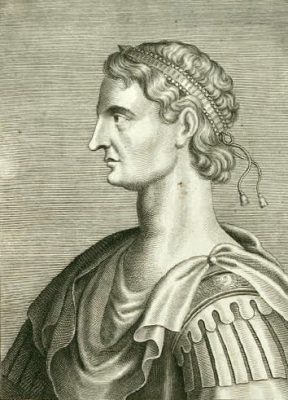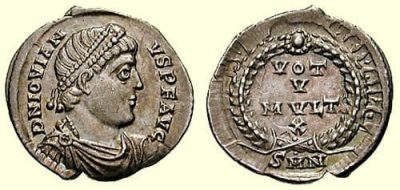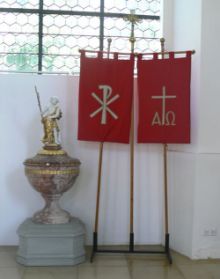Chapters
| Name | Flavius Iovianus |
|---|---|
| Ruled as | |
| Reign | 27 June 363 – 17 February 364 CE |
| Born | c. 331 CE |
| Died | 17 February 364 CE |
Jovian, also known as Jovianus, was born around 331 CE. in the city of Sinigidunum (present-day Belgrade) in the Roman province of Moesia, as Flavius Iovianus.
He was the son of Flavius (?) Varronian, the commander of the bodyguard (domestici et protectores) of Emperor Constantine II. He himself later joined this guard and in 363 CE reached the rank of the father. In this position, he accompanied Emperor Julian the Apostate in the Mesopotamian campaign against Shapur II, King of the Sassanids. After the decisive clash, Roman troops were forced to withdraw in front of a larger opponent.
On June 26, 363 CE Julian the Apostate died of his injuries, as a result of which a vacancy appeared on the throne. The next day, a specially convened military council decided to award the purple to Salutius Secundus, who, however, refused to seize power. After another conference, Jovian was proclaimed emperor, which caused considerable surprise among the soldiers. The Roman military and historian Ammianus Marcellinus suggests that Jovian may have been confused with another Jovian, the chief notary (primicerius notariorum).
Reign
Jovian was a Christian by religion and he took steps contrary to the policy of his predecessor – a supporter of pagan beliefs and the renewal of the spirit of Rome in the ancient faith. Jovian restored the structures of Christianity in the form of the Church. Upon arriving in Antioch, he revoked Julian’s edict against the Christians. He restored the legion’s banner introduced by Constantine the Great – labarum. He forbade all practice of magic and introduced religious tolerance.
With time, however, Jovian tightened his religious policy. He introduced an edict according to which the Library of Antioch was burned down, and on September 11, the law according to which the worship of the ancient gods was punishable by the death penalty. He extended this norm on December 23, when participation in all pagan ceremonies (even private ones) was also to be equal to death. In addition, by showing great respect to Athanasius the Great, Jovian restored him to the position of Bishop of Alexandria.
As for hostilities, Jovian continued his policy of retreat after the death of his predecessor. Despite the burdensome raids by Persian troops, the Roman army managed to reach the shores of the Tigris. Deep in foreign territory, Jovian was forced to seek understanding and peace at all costs. At the cost of his own security, he agreed to give up the five eastern provinces conquered by Galerius in 298 CE and then annexed by Diocletian. In addition, he agreed that the Persians should take control of the forts at Nisibis, Castra Maurorum and Singara. The Romans also gave up their influence in Armenia. Armenian king Arshak II was to remain neutral in the event of possible future conflicts and cede some lands to the Persians. The 30-year peace treaty was considered a disgrace and dishonour. Emperor Jovian dramatically lost popularity among the people and the army.
After arriving in Antioch, Jovian decided to go to Constantinople to consolidate his rule. On the way, the emperor was found dead in his bed in a tent in Dadastana, halfway between today’s Ankara and Iznik.
Death
He died on February 17, 364 CE in the city of Dadastana. It is believed that the cause of death could have been mushroom overeating or black smoke (his quarters were well burned with charcoal). Jovian was buried in Constantinople in the Church of the Holy Apostles. He was counted among the gods as Divus Iovianus.



